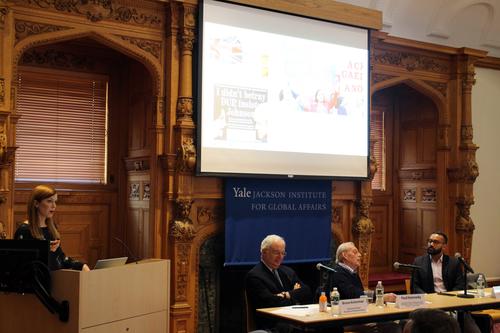
On Monday, October 28, 2019, the Yale Program in European Union Studies hosted the panel discussion titled “Brexit Briefing: Updates and Understanding a Country Divided.” Featured panelists include Bruce Ackerman, Sterling Professor of Law and Political Science, Nizam Uddin, 2019 World Fellow and Senior Head of Mosaic and Community Integration at the Prince’s Trust, and Bonnie Weir, Lecturer in Political Science. The panel was moderated by Paul Kennedy, J. Richardson Dilworth Professor of History and Distinguished Fellow of the Brady-Johnson Program in Grand Strategy. The event is the first of a two-part panel series examining the current Brexit crisis.
Nizam Uddin delivered the first speech. He began with the news of that very morning: the EU has granted the UK a Brexit extension until January 31, 2020. “It’s a unique time,” he summarized, “in that the country is constantly asked about its opinion but can’t make up its mind.” He approached the Brexit dilemma from a social integration perspective, emphasizing that it is important to understand the geographic and demographic divisions in the UK in the 2016 EU referendum in order to analyze the short term goals of political parties as they attempt to gain votes.
Further, Uddin cited two instances of hate crimes and speech related to Brexit: the murder of Member of Parliament Jo Cox in 2016 and the rhetoric of using Turkey’s unlikely accession to the EU as a pretext for voting Brexit. He highlighted that the heart of the problem is Brexit’s “enabling nature,” where people now feel entitled to express racism and hatred. “The trouble we have with the discussion around Brexit is no longer really about ‘do we leave the EU.’ He summarized. “It’s rather who we are as a country.”
Referencing the 2019 British prorogation controversy, Uddin provided examples of problematic language of the Prime Minister following the incident and on other occasions, and said he found “the intentional decay and erosion of trust deeply worrying.” “We absolutely need to preserve the trust in our institutions,” he stressed. He concluded his speech by relating recent developments of the Brexit debate and its negative psychological impact on the British.
Bonny Weir spoke next, drawing on over a decade of research that she had been conducting in Northern Ireland. Weir separated the impact of Brexit in Northern Ireland into two categories. First, it increased the opportunity and motivation for political violence, which undermined police intervention in areas under paramilitary control. Second, she highlighted the way that Brexit reopened key issues about people’s self-identification since the time of the Good Friday Agreement of 1998. She said, “the reason that this provision worked as well as it did was because the border [between Ireland and Northern Ireland] became invisible,” providing a “parity of esteem” for people who identify with Britain or Ireland or both. She argued that “with Brexit, the question raised about the border implies now that one identity may be more valid than the other.”
She added that the above problems will continue to be relevant as unionists and nationalists in Northern Ireland as well as UK residents continue to grapple with the future identity of Northern Ireland. She repeatedly stressed the relevance of the border as we examine militarized tension. She concluded with an emphasis on the positive role of the EU, noting that it “allowed for the border to be invisible and also supported the post-conflict institutions in working so well in respecting imaginative identities.”
Bruce Ackerman gave the last address. He situated the constitutional crisis that the UK is experiencing in a “systematic comparison of the rise of enlightenment constitutionalism in the 20th and 21st centuries.” He outlined three different paths to enlightenment constitutionalism: revolutionary, insider, and elitist. He then connected his discussion of different forms of constitutionalism to the historical developments in places such as the United States, China, and the Soviet Union.
Moving on to examine the 2016 EU referendum, he reminded the audience that “the referendum explicitly says it’s only advisory—it does not bind us at all in Parliament.” He suggested that the referendum raised two important questions: who should vote and what they should vote about. He cited the exclusion from voting of key groups, including British expatriates who have been abroad for more than 15 years. Towards the end of his speech, Ackerman clarified that the problem in the UK is not the lack of trust that people have in the government. “The question is whether the mainstream opinion understands the government to be legitimate,” he said.
Following the speeches, the panelists answered questions and provided their final reflections on the Brexit dilemma from their respective perspectives. The second panel of the two-part series, titled “What Does Post-Brexit Reconciliation Look Like: Global Perspectives,” will take place on December 3, 2019.
By Yilin Chen, Timothy Dwight College, Class of 2023

